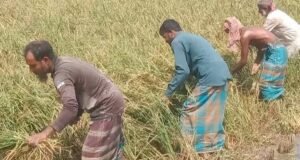
Historic Tea Workers Day. On this day in 1921, about 30 thousand tea workers of Sylhet region tried to return to their native place to be freed from British oppression. At this time tea workers were killed indiscriminately by firing at Meghnaghat in Chandpur. Since then, tea workers have been celebrating this day as ‘Tea Workers’ Day’.
Meanwhile, despite repeated demands and many agitations, the day has not been recognized in a hundred years. Deprivation of untouchable tea workers. On Saturday (May 20) at 10 a.m., a discussion meeting will be held to pay tribute to the martyrs of the Mulluke Chalo movement and to pay tribute to the martyrs of the Mulluk Chalo movement on behalf of various organizations including Bagan Panchayat at Mrittinga Cha Bagan of Kamalganj Upazila of Moulvibazar to demand state recognition of this day, tea workers’ land rights and quota for tea workers in terms of education and employment. .
Nirmal Das Painka, General Secretary of Manu-Dhalai Valley Executive Council of Bangladesh Tea Workers Union, said, “We are disappointed that the Tea Workers Day has not been recognized even after a hundred years. Despite repeated claims, it has been limited to only assurances. Father of the Nation Bangabandhu Sheikh Mujibur Rahman gave us recognition of the vote. We ask his honorable daughter Prime Minister Sheikh Hasina for state recognition of the day.
He also said, “Even though we call for the national celebration of the day every year, no government initiative is visible in this regard.” We are being brought to this country with false assurances and are being made to do backbreaking work with low wages. So the workers wanted to go back to their own Mullu. But they did not succeed. Tea workers are still deprived.
It is known that in the fifteenth and sixteenth centuries tea was not practiced anywhere else in the world except China. In 1854, the East India Company started growing tea experimentally in the Malinichara garden in Sylhet. At that time, workers were brought from different areas of India including Assam, Orissa, Bihar, Uttar Pradesh to build tea gardens in Greater Sylhet. Even if the workers came to Bangladesh under the temptation of ‘Gach Hillega, Rupee Milega’, it did not take long for them to break their mistake.
There is no account of how many workers have lost their lives in the hands of ferocious animals while clearing huge hills and planting tea plantations. Besides, there was oppression by the British. In protest against their continued torture, the then tea labor leaders Pandit Gangacharan Dixit and Pandit Deosaran called for the ‘Mulluke Chal’ (Go to the country) movement. On May 20, 1921, about 30,000 tea workers from Sylhet region reached Chandpur Meghna Steamer Ghat on foot from Sylhet. When they wanted to board the ship and return to their country, the British Gorkha soldiers fired and killed hundreds of tea workers and floated them in the Meghna River. Those who escaped were also subjected to brutal torture for the crime of agitating. Tea workers are taught a special tag. They did not get land rights. Since then, tea workers are celebrating the day as Tea Workers Day on May 20 every year.
Alumni Mridha and Meena Roy, women workers of Shamshernagar Kanihati tea garden in Kamalganj upazila said, “Hamra tea farmers got Tk 170 wages announced by the Prime Minister last year after many agitations and struggles. The dues have not been paid to the workers yet. How can I run the family with this salary? Due to the rising prices of goods in the market, the family cannot survive with this money. Five or seven people live in one house with children. How will the cost of the stars go?”
Sitaram Bean, a tea worker leader of Kanihati tea plantation and editor of the monthly Cha Mazdoor newspaper, said that disenfranchised tea workers have a tragic history. Tea workers who have been living in the country for almost two hundred years have exceeded the target of tea production by sweating for almost a year, but deprivation and scarcity do not leave them. With the passage of time, the prices of goods have increased, but their wages have not increased in the same way. Tea workers have to live with a daily wage of 170 taka.
The convenor of Moulvibazar, Cha Sramik Sangh, Rajder Kairi said, in the current commodity price market, the wage is 170 taka. He strongly demanded the government to meet the demands of land rights, quotas in education and jobs.
Meanwhile, on the occasion of the historic Tea Workers Day, Bangladesh Tea Workers Union Manu-Dhalai, Longla and Juri Valley Executive Council will pay tribute to the martyrs of the Mullukke Chalo Movement and discuss the meeting on Sunday (May 21) at 11 am at the Alinagar Tea Garden of Kamalganj Upazila. Chairman of Moulvibazar Zilla Parishad and General Secretary of District Awami League Alhaj Michbaur Rahman will attend the event as the chief guest. Former member of Bangladesh Awami League Central Executive Parliament, Chairman of Kamalganj Upazila Parishad, Bir Muktijoddha Professor Md. will be present as a special guest. Rafiqur Rahman.
Manu-Dhalai Valley Executive Council President Dhana Bauri and General Secretary Nirmal Das Paika requested the presence of all concerned in the Tea Workers Day programme.
 Weekly Bangla Mirror | Bangla Mirror, Bangladeshi news in UK, bangla mirror news
Weekly Bangla Mirror | Bangla Mirror, Bangladeshi news in UK, bangla mirror news







